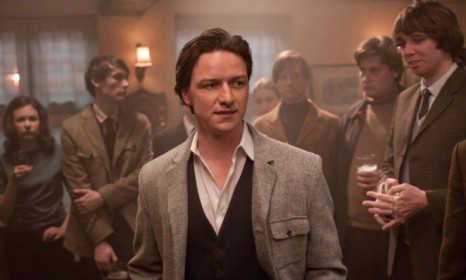Is X-Men: First Class too white?
The blockbuster superhero prequel is set in the civil rights era, and the film's mutants face plenty of prejudice, too. So where's the racial diversity?

A free daily email with the biggest news stories of the day – and the best features from TheWeek.com
You are now subscribed
Your newsletter sign-up was successful
X-Men: First Class, praised as a "summer blockbuster done right," traces the origins of a legion of young mutant superheroes back to the racially charged year 1962. The X-Men comics, on which the popular films are based, have featured mutants who were gay, Jewish, and black, connecting their marginalization to the larger mutants-as-outcasts narrative. Yet in X-Men: First Class, the superheroes fighting bigotry and prejudice are all white. The one black mutant? Let's just say he meets a clichéd Hollywood fate. Given the pointed relevance of the film's civil-rights-era setting, did the filmmakers blow it by "whitewashing" X-Men?
X-Men: First Class is bafflingly "blind to race": The film's mutants are as white "as Eagle Scouts from Mayfield," says Ta-Nehisi Coates at The New York Times. And they're supposed to be "bravely opposing bigotry and fear"? Not only is First Class blind to race, it's "blind to its own period." Here we have a film set "in the era of Ella Baker and the Rev. Dr. Martin Luther King Jr.," and "the most powerful adversaries of spectacular apartheid are a team of enlightened white dudes."
"You left out the part about…"
The Week
Escape your echo chamber. Get the facts behind the news, plus analysis from multiple perspectives.

Sign up for The Week's Free Newsletters
From our morning news briefing to a weekly Good News Newsletter, get the best of The Week delivered directly to your inbox.
From our morning news briefing to a weekly Good News Newsletter, get the best of The Week delivered directly to your inbox.
Actually, this is a post-racial film: The specific race of the mutants doesn't matter, say Nick Gillepsie and Matt Welch at the Los Angeles Times, because, in the end, it's a movie about "how to flourish as a community." Americans are more tolerant and diverse than ever, no longer identifying as "simply white or black." Instead, "we revel in our ongoing mongrelization and hybridization." The mutants capture the "social reality and social aspirations" of 2011 America. "Make no mistake: That's us up there on the screen."
"We are all X-Men in a multicultural world"
Let's not take the mutants-as-minorities allegory too far: Even though the cast is white, the film is obviously trying to draw parallels between its "protagonist mutants" and real-life ethnic minorities, says Kevin Marshall at the Times Union. But its attempt to equate the plight of its mutants to the struggles of minority groups like blacks and Jews "rings hollow" because the plot of X-Men: First Class "treats those groups so dismissively."
"Troubling treatments of racial and ethnic identity in X-Men: First Class"
A free daily email with the biggest news stories of the day – and the best features from TheWeek.com
Editor's Note: This article originally misidentified the year this film takes place in. It has since been revised. We regret the error.
-
 One great cookbook: Joshua McFadden’s ‘Six Seasons of Pasta’
One great cookbook: Joshua McFadden’s ‘Six Seasons of Pasta’the week recommends The pasta you know and love. But ever so much better.
-
 Scientists are worried about amoebas
Scientists are worried about amoebasUnder the radar Small and very mighty
-
 Buddhist monks’ US walk for peace
Buddhist monks’ US walk for peaceUnder the Radar Crowds have turned out on the roads from California to Washington and ‘millions are finding hope in their journey’